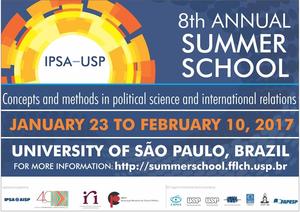

2017 São Paulo IPSA Summer School: Another Resounding Success!
Publication date: Tue, 14 Feb 2017
The 8th session of the IPSA-USP Summer School was held at the University of São Paulo from January 23 to February 10, 2017. Jointly organized by the University of São Paulo’s Department of Political Science and Institute of International Relations and the International Political Science Association (IPSA), the Summer School is recognized as a leading program providing basic and advanced training in a range of methodologies and techniques. In 2017, a record 282 students (from 51 institutions in 18 countries, with women accounting for 40% of the student body) enrolled in 19 one-week courses given by the Summer School.
The following one-week modules were offered:
- Basics of Causal Case Study Methods – Derek Beach, University of Aarhus
- Building Parametric Statistical Models – Glauco Peres da Silva, University of São Paulo
- Designing Feasible Research Projects in Political Science – Allyson L. Benton – CIDE
- Essentials of Applied Data Analysis – Leonardo Barone, University of São Paulo
- Methods and Problems in Political Philosophy – Herlinde Pauer-Studer, University of Vienna
- Modeling Dynamics – Lorena Barberia, University of São Paulo and Andrew Phillips, Texas A&M
- Advances in Modeling Dynamics – Lorena Barberia, University of São Paulo and Guy Whitten and Andrew Phillips, Texas A&M
- Basics of Multi-Method Research: Integrating Case Studies and Regression – Jason Seawright, Northwestern University
- Basics of Quantitative Methods for Public Policy Analysis – Bruno Cautrès, Science Po
- Basics of Set-Theoretic Methods and Qualitative Comparative Analysis (QCA) – Carsten Schneider, Central European University
- Basics of Spatial Interdependence in Theory and Practice – Laron Williams, University of Missouri
- The Philosophy of Science: Positivism and Beyond – Patrick T. Jackson, American University
- Using Case-Based Methods in Practice – Derek Beach, University of Aarhus
- Advanced Issues in Multi-Method Research: Integrating Case Studies and Contemporary Methods for Causal Inference – Jason Seawright, Northwestern University
- Advanced Issues in Set-Theoretic Methods and Qualitative Comparative Analysis (QCA) – Carsten Schneider, Central European University
- Advanced Issues in Quantitative Methods for Public Policy Analysis – Bruno Cautrès, Science Po
- Essentials of Multiple Regression Analysis – Glauco Peres da Silva, University of São Paulo
- Modeling Dynamics in Space and Time – Guy Whitten, Texas A & M University and Lorena Barberia, University of São Paulo
- Predicting Elections – Clifford Young, IPSOS-Washington
Students also participated in three information sessions on studying in Europe and the U.S., replication in qualitative research, and recent controversies regarding p-values. A late-afternoon seminar on “Why do voters disagree about the strength of the national economy? A hybrid model of spatial evaluations” was delivered by Laron Williams. Clifford Young, Jason Seawright, and Guy Whitten participated in a panel discussion on “Explaining the U.S. Election.” Top prize in the 2017 poster competition was presented to Marina Merlo for her poster “Women, Political Parties and Elections: A Long Way to Run?”
Institutional Partners
The 2017 IPSA-USP Summer School was made possible with the generous financial support of the Department of Political Science, the Institute of International Relations, the School of Philosophy, Letters and the Humanities (FFLCH), and the Provost’s Office for Research at the University of São Paulo. We are also grateful for the valuable support provided by FAPESP, CAPES, and CNPq. Together, these public sector research funding institutions have been long-time supporters of the Summer School and invaluable to its success. The Summer School is also supported by the Center for Metropolitan Studies (CEM) and the Center for Comparative and International Studies (NECI) at the University of São Paulo. Scholarships for participants of the School from developing countries were provided by IPSA and Ipsos. Stata provided software licensing for the computer laboratories.
Local Organization Committee
Lorena Barberia, Department of Political Science, University of São Paulo (Chair)
Daniela Schettini, Institute for International Relations, University of São Paulo
Glauco Peres da Silva, Department of Political Science, University of São Paulo
Adriana Schor, Institute for International Relations, University of São Paulo











